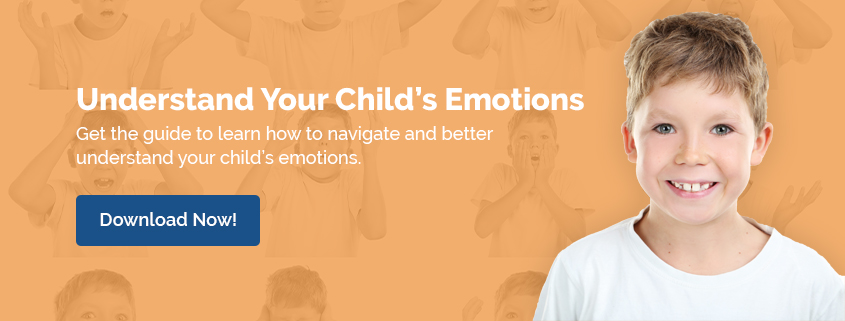9 Types of Behavioral Health Therapy to Improve Your Child’s Mental Health
Children have a lot of feelings swirling around, whether or not a mental health condition is present — and it can often be hard for them to express things clearly. Mental health services provide helpful tools for children so that they can learn the skills needed for regulating their emotions.
If your child is struggling with behavior issues, such as anger management or tantrums, there are many effective types of behavioral health therapy for kids.
*If this is an emergency, please call 9-1-1.
Cognitive Behavioral Therapy (CBT)
Cognitive Behavioral Therapy is a form of psychotherapy (also known as talk therapy) that helps change negative patterns in thinking and behavior. CBT is a helpful mental health treatment for many issues, including depression, anxiety disorder, alcohol problems, substance abuse, eating disorders, and behavioral problems.
This type of treatment plan focuses on reversing counter-productive ways of thinking, reducing negative behavior patterns, and finding helpful coping mechanisms.
Dialectical Behavior Therapy (DBT)
Dialectical Behavior Therapy, referred to as DBT, is Cognitive Behavioral Therapy adjusted to help people with borderline personality disorder (BPD), but it can also be beneficial for young children and teens coping with other mental health issues. DBT focuses on helping people better manage their emotions. The goal is to increase positive behaviors, reduce self-destructive actions, and improve relationships.
In DBT, therapists teach new skills like managing distress without self-harm, effectively communicating with others, setting effective boundaries, and changing negative thinking patterns into more realistic thoughts.
Play Therapy
Play therapy is a form of therapy that involves a child playing with toys, dolls, and other items. The therapist observes the child playing with little intervention and uses the play to help children express their feelings and practice problem-solving.
The child therapist may ask questions about what the child is doing during the play session or may use special techniques to encourage a positive response from the child. The main goal of this type of therapy is not for children to become better at using their words, but rather for them to express themselves through their actions and dialogue within their imaginary world.
Art Therapy
Art therapy is helpful for children who have trouble expressing themselves or their emotions clearly, but helps them to express themselves in the form of artwork. By assessing the art, mental health care professionals gain a better understanding of the patient’s mental health problems or concerns.
Art therapy can include various mediums, from finger painting for younger children to photography or drawing for older adolescents and teenagers.
Social Skills Training
Social skills training (SST) is a type of therapy that helps kids develop the social skills needed to interact with others. SST can be done through the help of a therapist, social worker, or even teachers. Social skills training focuses on everyday interactions and teaches kids communication skills for talking with their peers (and family at home).
Practicing social skills can greatly benefit those with mental health disorders like autism, mood disorders, personality disorders, social anxiety disorders, and more.
Parent-Child Interaction Therapy (PCIT)
PCIT is a form of therapy that focuses on improving the relationship between parents and their children. The goal of PCIT is to help the parent become more effective in understanding and responding appropriately to their child’s behavior.
PCIT can also help parents learn how to control their own behavior and help their child, who may be acting out because they’re having difficulty regulating emotions or understanding what others are feeling.
Family Therapy
Family therapy is another beneficial behavioral health therapy for kids and their caregivers. Family therapists help parents better understand the issues that their child is facing, and provide coping strategies that allow parents to better support their children.
Family therapists work with both parents and children to help them understand each other’s needs and feelings. While this type of therapy focuses on the needs of both parties, it also provides an opportunity for parents to learn how they can better connect with their children while building a strong bond.
Group Therapy
Group therapy is a type of treatment that involves meeting with a therapist and other patients who have similar conditions. Group therapy sessions are beneficial for those suffering from depression, anxiety, attention deficit hyperactivity disorder (ADHD), and other mental health issues.
Support Groups
Similar to group therapy, support groups help children struggling with their mental health. Meetings with a group of other adolescents going through the same issues can be extremely beneficial. When your child knows that they’re not alone (and that others are struggling with similar problems) their self-esteem can improve drastically.
Professional Help for Mental Health Conditions
Many kids are able to better manage their behavior with the support of mental health professionals; the form of therapy varies, depending on each child’s needs and preferences.
Because there are so many types of behavioral health therapies for kids, finding the best fit for your child can be overwhelming. If you are unsure what form of therapy would be the most helpful, reaching out to your child’s pediatrician for a referral is a great first step.
Meridian HealthCare can also work with you to determine the services that will work best to improve your child’s mental health and overall well-being. Call today to schedule a consultation.






